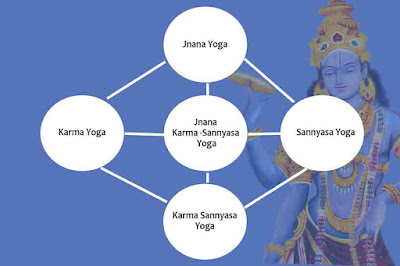KARMA YOGAM | INTRODUCTION
SRIMAD BHAGAVAD GITACHAPTER – 3 | INTRODUCTION
KARMA YOGAM | കർമ്മ യോഗം

The third chapter of
the Bhagavad Gita is named Karma Yoga or the Path of Action or in other words Selfless
Service. Here Lord Krishna emphasizes the importance of karma in life. He
reveals that it is important for every human being to engage in some sort of
activity in this material world. Further, he describes the kinds of actions
that lead to bondage and the attempts that lead to liberation. Those persons
who continue to perform their respective duties or swa-dharmas as a prayer to
the Supreme or a higher ideal, without attachment to its rewards get liberation
or moksha.
Sri Krishna, in the chapter
2, recommends buddhi-yoga, as the path of self-realization. Whereas Arjuna
thought this as retiring from active life and practicing penances in a secluded
place. But Bhagavan is also insisting him to fight the battle. So this chapter
3 starts with Arjuna’s questions by putting forward this confusion to Sri Krishna.
Bhagavan clears his confusion by explaining Karma Yoga.
In another way, at
the opening of the 3rd Chapter, Arjuna is confused by Sri Krishna’s
instructions in the chapter 2. He has misconceived that Sri Krishna’s advice to
control the senses and fix the mind and intelligence onto the Supreme is
incompatible with the performance of action. Therefore he questions why Bhagavan
is requesting him to engage in warfare. In response, Sri Krishna explains
karma-yoga, the performance of actions; free from desire for selfish, fruitive
gain and dedicated to the Supreme.
So, in summary what we are going to learn in chapter 3 shall be the practical knowledge of the most familiar verse.
“karmaṇy-evādhikāraste mā phaleṣhu kadāchana |
mā karma-phala-hetur bhūr mā te saṅgo ’stvakarmaṇi”.
It means,
you only have the right over action, not ever to the outcome.
Never consider yourself to be the cause of the results of the actions and
don’t get
attached to inaction.
ശ്രീമദ് ഭഗവദ് ഗീതാ
അദ്ധ്യായം - മൂന്ന് | കർമ്മ യോഗം
ഭഗവദ്ഗീതയുടെ മൂന്നാമത്തെ അധ്യായത്തിന് കർമ്മയോഗം അല്ലെങ്കിൽ പ്രവർത്തന മാർഗ്ഗം അല്ലെങ്കിൽ മറ്റൊരു വിധത്തിൽ പറഞ്ഞാൽ നിസ്വാർത്ഥ സേവനം എന്ന് വിളിക്കാം. ഇവിടെ ശ്രീകൃഷ്ണൻ ജീവിതത്തിൽ കർമ്മത്തിന്റെ പ്രാധാന്യം ഊന്നിപ്പറയുന്നു. ഈ ഭൗതിക ലോകത്ത് ഓരോ മനുഷ്യനും ഏതെങ്കിലും തരത്തിലുള്ള പ്രവർത്തനങ്ങളിൽ ഏർപ്പെടേണ്ടത് പ്രധാനമാണെന്ന് ഭഗവാൻ വെളിപ്പെടുത്തുന്നു. കൂടാതെ, വിമോഹത്തിലേക്ക് നയിക്കുന്ന തരത്തിലുള്ള പ്രവർത്തനങ്ങളെയും മോക്ഷത്തിലേക്ക് നയിക്കുന്ന ശ്രമങ്ങളെയും അദ്ദേഹം വിവരിക്കുന്നു. ഒരുയർന്ന ഉപാസനാ തലത്തിലേക്കുള്ള പ്രാർത്ഥനയായി സ്വധർമ്മങ്ങളും ഉത്തരവാദിത്തങ്ങളും ചെയ്തു തീർക്കുന്നവർക്ക് അതിന്റെ പ്രതിഫലങ്ങളോട് ബന്ധമുക്തമായി മോക്ഷം ലഭിക്കുന്നു.
സ്വയം സാക്ഷാൽക്കാരത്തിന്റെ പാതയായി ശ്രീകൃഷ്ണൻ രണ്ടാം അധ്യായത്തിൽ ബുദ്ധി യോഗത്തെ ഉപദേശിക്കുന്നു. ഭഗവാൻ പറഞ്ഞത് സജീവമായ ഭൗതിക തലത്തിൽ നിന്ന് വിരമിക്കുകയും ആളൊഴിഞ്ഞ സ്ഥലത്ത് തപസ്സുചെയ്യുകയും ചെയ്യുന്നതായി അർജുനൻ കരുതി. എന്നാൽ അതേസമയം,യുദ്ധം ചെയ്യാനും ഭഗവാൻ നിർബന്ധിക്കുന്നുണ്ട്. അതിനാൽ ഈ ആശയക്കുഴപ്പം ശ്രീകൃഷ്ണന്റെ മുന്നിൽ സമർപ്പിച്ച് അർജ്ജുനൻ ഉയർത്തുന്ന ചോദ്യങ്ങളിൽ നിന്നാണ് ഈ അധ്യായം മൂന്ന് ആരംഭിക്കുന്നത്. കർമ്മയോഗം വിശദീകരിച്ചുകൊണ്ട് ഭഗവാൻ അർജുനനറെ ആശയക്കുഴപ്പം ഇല്ലാതാക്കുന്നതാണ് മൂന്നാം അദ്ധ്യായത്തിൽ നാം പഠിക്കാൻ പോകുന്നത്.
മറ്റൊരു വിധത്തിൽ, രണ്ടാം അധ്യായത്തിലെ ശ്രീകൃഷ്ണന്റെ നിർദേശങ്ങളാൽ ആശയക്കുഴപ്പത്തിലാകുന്ന അർജ്ജുനന്റെ സംശയങ്ങളുമായാണ് മൂന്നാം അദ്ധ്യായം തുടങ്ങുന്നത്. ഇന്ദ്രിയങ്ങളെ നിയന്ത്രിക്കാനും മനസ്സിനെയും ബുദ്ധിയെയും പരമോന്നത തലത്തിലേക്ക് ഉയർത്താനുമായി ശ്രീകൃഷ്ണൻ പകർന്നു നൽകിയ ഉപദേശം വൈരുദ്ധ്യാല്മകമാണെന്ന് അദ്ദേഹം തെറ്റിദ്ധരിച്ചു. ഒരേ സമയം ബുദ്ധി യോഗവും യുദ്ധം ചെയ്യാനുള്ള ആഹ്വാനവും ഭഗവാൻ അരുളിച്ചെയ്യുന്നത് അർജുനൻ ചോദ്യം ചെയ്യുന്നു. പ്രതികരണമായി, ശ്രീകൃഷ്ണൻ സ്വധർമ്മങ്ങളുടെ പ്രകടനമായ കർമ്മയോഗം വിശദീകരിക്കുന്നു; സ്വാർത്ഥത, ഫലപ്രാപ്തി എന്നിവയിലുള്ള ആഗ്രഹത്തിൽ നിന്ന് മുക്തനാകുകയും പരമോന്നതഭാവത്തിൽ സർവ്വവും സമർപ്പിക്കുകയും ചെയ്യാനായി ഉപദേശിക്കുന്നു.
അതിനാൽ, ചുരുക്കത്തിൽ, നമ്മൾ മൂന്നാം അധ്യായത്തിൽ പഠിക്കാൻ പോകുന്നത് ഏറ്റവും പരിചിതമായ ശ്ലോകത്തിന്റെ പ്രായോഗിക പരിജ്ഞാനമായിരിക്കും.
"കർമ്മണ്യേവാധികാരസ്തേ മാ ഫലേഷു കദാചന;
മാ കർമ്മഫലഹേതുർ ഭൂർമാ തേ സംഗോഽസ്ത്വകർമ്മണി".
ഇതിനർത്ഥം,
നിനക്ക് കർമ്മം ചെയ്യാനുള്ള അധികാരം മാത്രമേയുള്ളൂ,
ഒരിക്കലും അതിൻ്റെ ഫലത്തിലില്ല.
കർമ്മഫലങ്ങളുടെ കാരണം നീയാണെന്ന് ഒരിക്കലും കരുതരുത്,
അകർമ്മം അഥവാ നിഷ്ക്രിയത്വവുമായി ബന്ധവുമരുത്.
🔺🔺🔺🔺🔺🔺🔺🔺🔺🔺



Comments
Post a Comment